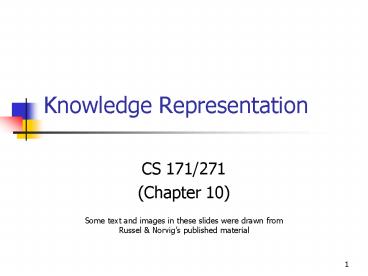Knowledge Representation - PowerPoint PPT Presentation
1 / 13
Title:
Knowledge Representation
Description:
Some text and images in these s were drawn from. Russel & Norvig's published material ... Propositional and First-Order Logic describe the technology for ... – PowerPoint PPT presentation
Number of Views:55
Avg rating:3.0/5.0
Title: Knowledge Representation
1
Knowledge Representation
- CS 171/271
- (Chapter 10)
- Some text and images in these slides were drawn
fromRussel Norvigs published material
2
Using Logic forKnowledge Representation
- Propositional and First-Order Logic describe the
technology for knowledge-based agents - What gets into these knowledge bases?
- Categories, objects, substances
- Agent actions, situations, events
- Beliefs
- Uncertain information
- Dynamic information
3
Categories
- Representing categories
- As predicates Singer( Madonna)
- As objects Member( Madonna, Singers ) or
Madonna ? Singers - Related notions
- Subclasses/subcategories ( ? )
- Categories versus properties
- Categories of categories
4
Relationships between Categories
- Disjoint categories
- Disjoint( Animals, Vegetables )
- Exhaustive decomposition
- ExhaustiveDecomposition( Faculty,Staff,Administra
tors, UniversityPersonnel ) - Partition
- Partition( Males,Females, Persons )
5
Physical Composition
- Part-of relationship
- Composite objects
- With structural properties (e.g., car as
something with wheels and other things attached
to it) - Bunches (e.g., apples in a bag)
6
Measurements
- Measures as objects
- Measure a number with units
- Example
- Length(L1) Inches(1.5)
7
Substances and Objects
- World not necessarily individuated
- Not always divided into distinct objects
- In the English language
- Count nouns versus mass nouns
- Has special properties
- Examplex ? Butter ? PartOf( y,x ) ? y ? Butter
8
Actions
- In the context of an agent, we need to represent
actions and consequences - Need to aslo worry about percepts, time, changing
situations, and many others - Situation calculus or event calculus
9
Situation Calculus
- Situations
- Objects/terms that stand for the states between
actions carried out (initial situation and
generated situations after an action) - Result( a, s ) names the resulting state when
action a is executed in situation s - Fluents
- Predicates/functions that vary across situations
- Eternal predicates
- Not dependent on situation
10
Actions in Situation Calculus
- Possibility Axiom
- preconditions ? Poss( action, situation )
- Examplecan move to a square if it is adjacent
- Effect Axiom
- Poss( action, situation ) ? changes
- Examplemoving updates agent position
11
Frame Problem
- In the real world, most things stay the same from
one situation to the next - Change occurs for a tiny fraction of the fluents
- Note effect action would often only note those
changes - Frame problem problem of representing those that
stay the same - Efficiency/compactness issue
- Representational versus Inferential
12
Event Calculus
- Time as objects
- Fluents hold at points in time
- Reasoning can be made over time intervals
13
Other Challenges
- Beliefs
- Uncertain Information
- Dynamic Information
- Read Chapter 10































